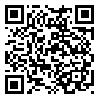BibTeX | RIS | EndNote | Medlars | ProCite | Reference Manager | RefWorks
Send citation to:
URL: http://ioh.iums.ac.ir/article-1-1536-en.html
Background and aim: Air traffic control has known as a complex cognitive task, which requires controller to focus on task for long time. Mental workload plays an important role in the performance of controllers. The aim of this study was to assess the workload of air traffic controller on the basis of task load factors.
Methods: The present descriptive-analytical study was conducted among fourteen air traffic controllers. First, air traffic control tasks were determined using hierarchical task analysis (HTA) technique and two low and high workload scenarios were designed based on the task load factors for controlling job. Next, the workload of the controllers were assessed in these two scenarios by NASA-TLX inventory.
Results: The results of HTA showed that air traffic control contains 49 main subtasks. The findings of the NASA-TLX showed that under high workload condition, mental demand with mean scores of 71/93 was the most overloaded task. Moreover, there were significant relationship between mental, physical, temporal demands, effort and frustration under high and low workload (P value>0/05). Whereas, it was not significant for performance variable under both low and high level conditions (P value<0/05).
Conclusion: The findings emphasize the importance of task load factors concerning air traffic controllers. Therefore, other evaluation methodologies is suggested with focused on the task load factors including Performance Assessment in all sectors of air traffic control center.
Received: 2015/06/21 | Accepted: 2015/12/14 | Published: 2016/11/2
| Rights and permissions | |
 |
This work is licensed under a Creative Commons Attribution-NonCommercial 4.0 International License. |





